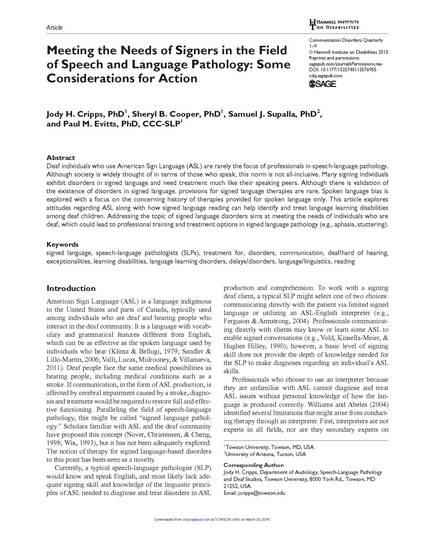
Article
Meeting the Needs of Signers in the Field of Speech and Language Pathology: Some Considerations for Action
Communication Disorders Quarterly
(2015)
Abstract
Deaf individuals who use American Sign Language (ASL) are rarely the focus of professionals in speech-language pathology. Although society is widely thought of in terms of those who speak, this norm is not all-inclusive. Many signing individuals exhibit disorders in signed language and need treatment much like their speaking peers. Although there is validation of the existence of disorders in signed language, provisions for signed language therapies are rare. Spoken language bias is explored with a focus on the concerning history of therapies provided for spoken language only. This article explores attitudes regarding ASL along with how signed language reading can help identify and treat language learning disabilities among deaf children. Addressing the topic of signed language disorders aims at meeting the needs of individuals who are deaf, which could lead to professional training and treatment options in signed language pathology (e.g., aphasia, stuttering).
Keywords
- Signed Language,
- Speech-Language Pathologists,
- Treatment for,
- Disorders,
- Communication,
- Deaf/Hard of Hearing,
- Exceptionalities,
- Learning Disabilities,
- Language Learning Disorders,
- Delays/Disorders,
- Language/Lingusitics,
- Reading
Disciplines
Publication Date
2015
DOI
10.1177/1525740115576955
Publisher Statement
SAGE
Citation Information
Jody H Cripps, Sheryl B Cooper, Samuel J Supalla and Paul M Evitts. "Meeting the Needs of Signers in the Field of Speech and Language Pathology: Some Considerations for Action" Communication Disorders Quarterly Vol. 37 Iss. 2 (2015) p. 108 - 116 Available at: http://works.bepress.com/jody-cripps/12/
